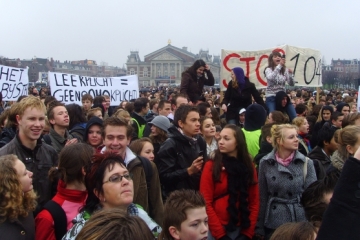Dutch education goes for silver rather than gold
 Dutch education goes for silver rather than gold and for good reason, writes INSEAD adjunt professor Annet Aris.
Dutch education goes for silver rather than gold and for good reason, writes INSEAD adjunt professor Annet Aris.
The academic year at international business school Insead in Fontainebleau, France has started again. Some 500 new MBA students from around the world are attending their first lectures, getting acquainted with their peers and suffering the traditional good-humoured pranks of the older students. After a tough selection period of essays, tests and interviews they are visibly proud and excited to be here.
For many the procedure was a familiar one. They went through the same mill for their Bachelor’s degree. It is the only way to win a place at an elite university in their country. Selection starts as early as secondary school and sometimes earlier. The results obtained there determine what their future will look like.
Selective enough?
Things are very different in the Netherlands. Apart from a few career choices blocked by a numerous clausus, any Dutch student with a vwo (pre-university stream, DN) diploma stands a good chance of studying his chosen subject at his preferred university. This is frequently cause for discussion: is the Dutch system selective enough? In a time of a global war for talent can we afford not to have an Oxford, Harvard or Insead on the Rhine?
Shouldn’t students prove they have what it takes to make it to the top much earlier in their school career? How damaging is the Dutch culture of being satisfied with mediocre results in a digital world in which talent is being compared on a worldwide scale?
A nation of ‘fairs’ is not going to cut it, it’s true. But I would prefer a culture of ‘good’ over ‘excellent’. Identifying talent early on and stimulating it separately may seem like a good idea but the disadvantages could well outnumber the benefits.
Boring
As anyone who has had any dealings with teenagers knows, there is a sizeable group of youngsters who find excelling at academic work infinitely boring but who later on, once their hormones have settled down, obtain very good results.
Early ‘stratification’ benefits a small group which studies under the very best of circumstances but it also puts a much larger group which ranks just below at a disadvantage. They won’t have access to the best professors and will be deprived of stimulating exchanges with their highly talented fellow students. The difference in quality between students will increase and chances are the net result will be a negative one.
Nor is being separated from the rest of the student population necessarily a good thing for the elite students themselves. Research carried out by Dutch Insead professor Roderick Swaab shows that teams crammed with talented people often achieve worse results than teams with a more balanced composition. This is also known jokingly as the ‘Van Gaal effect’.
In his book David and Goliath, Malcolm Gladwell argues that students who go to top universities but are not ranked among the best students often perform worse in the end than the initially weaker students who go on to shine at average universities. The likely cause is that the self-confidence of these students is irreparably damaged in the highly competitive surroundings of a top academic institution. Becoming a well-functioning adult depends on more than intellectual skills alone. Being part of a more diverse group will help that process considerably.
Silver
Thus it is better to gain lots of silver medals than a very few gold ones. The good news is that the Netherlands is well on the way: which country with fewer than 20 million inhabitants (0.3 percent of the world population) can claim to have about half – depending on the ranking you are looking at – of its ‘normal’ state universities in the top 100 of best universities in the world and almost all of its universities in the top 150?
It’s an achievement we can be proud of. But we have to be careful not to throw out the baby with the bath water. Dutch competitiveness depends on a broad group of well-educated people. Top talents will always go abroad and hopefully the Netherlands is attractive enough to lure them back eventually. Let’s invest in making sure that our silver doesn’t turn into bronze instead of aiming for gold with a few very expensive, prestige-driven projects.
Annet Aris is adjunct professor at international business school Insead.
This article appeared earlier in the Financieele Dagblad.
Thank you for donating to DutchNews.nl.
We could not provide the Dutch News service, and keep it free of charge, without the generous support of our readers. Your donations allow us to report on issues you tell us matter, and provide you with a summary of the most important Dutch news each day.
Make a donation